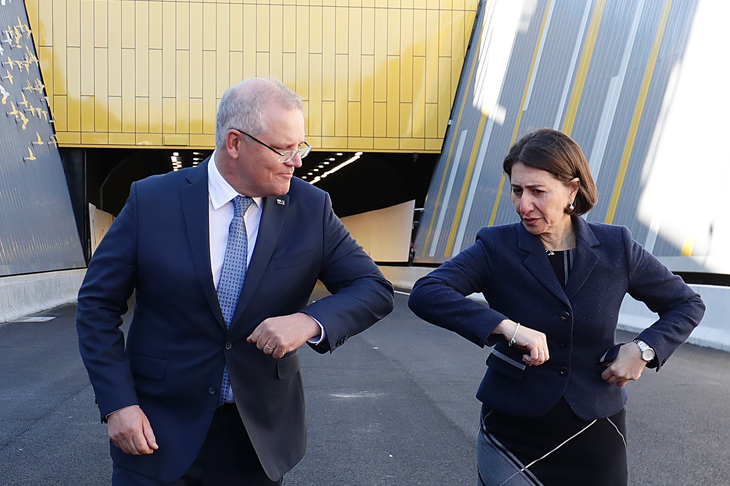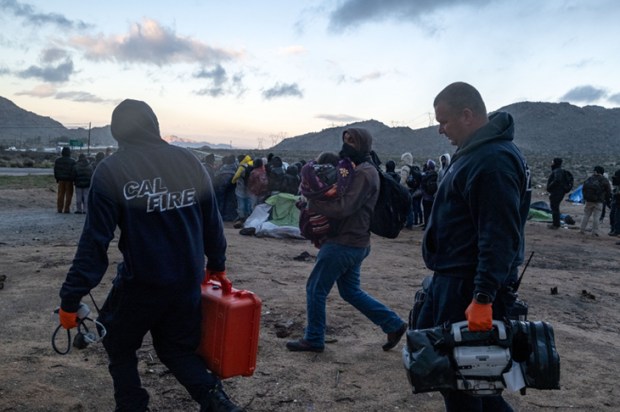Last month, Australia’s top bureaucrat congratulated himself on the creation of the so-called National Cabinet, saying that this had made Australia’s response to the pandemic ‘one of the best, if not the best, in the world in terms of the federations’. Earlier, the prime minister had likewise patted himself on the back for making a monthly National Cabinet meeting with the premiers and chief ministers a permanent feature of Australian governance. These National Cabinet meetings would be, Scott Morrison proclaimed, totally different from the old twice-a-year Council of Australian Governments’ meetings. This is because there would be less bureaucracy, a ‘laser-like focus on creating jobs’, and – even though there’d be twelve meetings a year rather than just two – it would somehow ‘streamline all of those endless meetings’.
In times of crisis the script is always the same: we need national unity, singularity of purpose and getting things done without counter-productive bickering. Almost by definition, meetings that break up in acrimony – as COAG sometimes did – with the Commonwealth refusing to provide the extra money that the states invariably wanted, and different states vowing to go their own way, generate dissatisfaction and demands for reform. But the problem is not the nature and the number of meetings between the PM and the premiers. The problem is that the states have legal responsibility for too much that the Commonwealth is paying for and that Coalition and Labor governments invariably disagree about the best way to resolve the nation’s problems.
In fact, like National Cabinet, COAG meetings nearly always went well too, on condition that they stuck to generalities and as long as the Commonwealth was paying for each state to do whatever it thought best. After one Howard-era COAG meeting to set up working parties to look at young people in nursing homes, the development of a national system of apprentices, as well as climate change and energy, then-Queensland Premier Peter Beattie said, ‘I’ve been coming here for seven years and this is the best COAG meeting I’ve been to’. Yet 15 years later, we still have young people in nursing homes, there’s still no national system for apprentices, and reconciling the need for affordable and reliable power with the desire to reduce emissions is as elusive as ever.
Given that the Commonwealth is generally responsible for border protection while the states are responsible for quarantine and that the Commonwealth generally funds health services in the community while the states run public hospitals, frequent meetings to share information or to canvass possible courses of action – live or online – between the PM and the premiers would certainly have been necessary to manage this pandemic. But a meeting of different heads of government can only be described as a ‘cabinet’ if that term has lost all meaning.
In any cabinet worthy of the name, decisions are what the cabinet chairperson decides they are and are binding on all members. But despite the existence of this so-called National Cabinet, on border closures, school openings and social distancing restrictions, each state has done exactly what it pleased regardless of the prime minister’s preference or of any supposed National Cabinet decision. In practice, each in their own way, the states have managed (or mismanaged) the health aspects of the pandemic and the Commonwealth has financially supported the consequences of their decisions. Indeed, the most consequential decision of all those taken so far – to require all incoming travellers to quarantine for two weeks – has been jeopardised by Victoria’s hugely negligent running of supposedly secure hotels at odds with every other state.
The main impact of the National Cabinet so far has not been to produce sensible and uniform pandemic management practice but to stifle criticism of the states’ mistakes or over-reactions and to constrain the Commonwealth’s ability to make decisions to measures that the Labor states would support. Arguably, it’s diminished the PM from first-among-equals (in a real cabinet) to just another one of the country’s seven most important political decision-makers in a glorified premiers’ conference.
The prime minister has declared that it’s the National Cabinet’s task to lead the recovery from the worst economic crisis since the Great Depression. It would indeed be wonderful if the Commonwealth and the states, Labor and Liberal/National, could arrive at a consensus on the reforms needed to create jobs and boost prosperity. But does anyone really think that the Coalition and Labor will agree on slashing green tape, boosting workplace flexibility, building more dams, getting more baseload power into the system, and avoiding added costs such as the already legislated superannuation guarantee increases? So far, the only bipartisanship in dealing with the pandemic has been over the Commonwealth spending unsustainable amounts of borrowed money. And previous federal-state bi-partisanship most notably featured the National Energy Guarantee that put reducing emissions ahead of cutting power prices and that needed a party room revolt and a new prime minister to remedy. Rather than trying to get all other governments to agree, the challenge for each one of our governments should be working out how to get anything significant done.
The problem with our federation is not too few meetings or too many bureaucrats; it’s ‘the dog’s breakfast of divided responsibilities’, as Tony Abbott used to say. At the start of this government’s life, a white paper process was put in train to try to clarify which level of government would do what and how each level of government could fully fund the things for which it was responsible. The idea was to try to ensure that someone was always clearly in charge and that voters would always know who to blame when something went wrong. Malcolm Turnbull dumped this attempt to make each government ‘sovereign in its own sphere’ and now, via the National Cabinet, Scott Morrison seems to want to make all governments responsible for everything. So we won’t just be poorer at the end of this pandemic, as a nation we’ll be even less capable of making sensible decisions.
Got something to add? Join the discussion and comment below.
Get 10 issues for just $10
Subscribe to The Spectator Australia today for the next 10 magazine issues, plus full online access, for just $10.
Ross Fitzgerald’s most recent book is a memoir, ‘Fifty Years Sober.’
You might disagree with half of it, but you’ll enjoy reading all of it. Try your first month for free, then just $2 a week for the remainder of your first year.














Comments
Don't miss out
Join the conversation with other Spectator Australia readers. Subscribe to leave a comment.
SUBSCRIBEAlready a subscriber? Log in